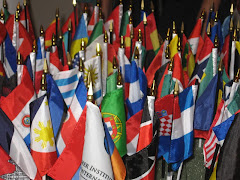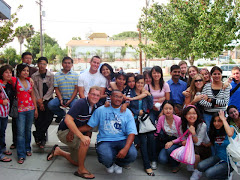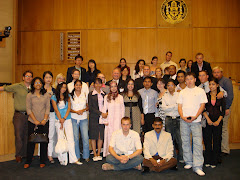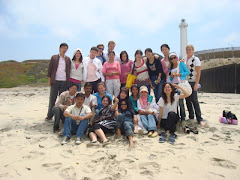 I feel I should start with somewhat of a disclaimer. At times I’m afraid my thoughts and feelings may seem over simplified, or in someway “basic” in nature, but in no way do I intend to devalue or under represent the issues I believe to be important in the world today. With that said, I will attempt to convey my beliefs, concerns, and experiences to the best of my ability.
I feel I should start with somewhat of a disclaimer. At times I’m afraid my thoughts and feelings may seem over simplified, or in someway “basic” in nature, but in no way do I intend to devalue or under represent the issues I believe to be important in the world today. With that said, I will attempt to convey my beliefs, concerns, and experiences to the best of my ability.Being born and raised in the United States seems to have provided me with a unique perspective of society, specifically religion. It seems that as Americans we have a very different view of the world in which we live, and we have a very different view of our place in it. I was raised with the belief that I could grow up to be whatever I wanted to be, that my destiny was to be determined by me and me only. I have come to realize that this is not the case around the world, and this idea challenged my way of thinking. After great thought and consideration, I am now able to appreciate the complex differences in what appear to be very basic ways of thinking.
My way of thinking is somewhat based on where I was raised. I was born in Western Kentucky and grew up across the Ohio River in Southern Indian. This area is located in what is referred to as the bible belt of America. Religion has a strong hold on the society there, and it reflects heavily in the people and their beliefs. I, too, have been affected by religion, despite not claiming any religious affiliation.
My dad comes from a strong Catholic family. He and his brothers and sisters all went to a Catholic High School, the same high school that my mamaw (paternal grandmother) worked at. To this day, many of them remain very active in the Catholic Church. Others are only active participants around the major holidays. I’m not sure in what denomination my mother was raised, but my mother’s family was certainly mainline Protestant. I was raised in the Methodist church, and often was taken to a nondenominational church. My maternal grandparents are, and always have been, very religious.
There was a time when I, too, was strongly involved in the church and youth group. But as time went by, I couldn’t help but to sense that these institutions alienated so many people. I couldn’t understand why an institution that was supposedly set up to preach the word of God, and to exemplify his teachings could pick and choose who was worthy of their preaching. Perhaps the final straw was when I learned of how religion played a major part in my mother and my father’s marriage; then again divorce would be more appropriate. Because my mother was not Catholic, my parents could not be married in a Catholic church. I do not believe my parents were too concerned with this, but my paternal grandfather was deeply bothered. He refused to attend the wedding and did not support their marriage. My father was asked never to return to the Catholic Church and for what? Because he found a partner that made him happy, with whom he wanted to spend the rest of his life with?
The tension that this caused was so detrimental that a few short years later my parents divorced. Granted, this was not the sole issue, but it caused a large enough crack in the foundation, that there marriage eventually gave way to all the pressures. On a daily basis I was similar examples of detrimental religious tensions. It seems that all to often, those who are very adamant in their religion tend to have the opinion that their religious views are correct, which makes all others wrong. This idea has always perturbed me. Who am I to say who is right and who is wrong? That my God is better than yours, ignoring any possibility that God and have more than one name, more than one identity? It is my opinion that it is this strictly constructed view within organized religion that causes conflict.
I have had the opportunity to take several classes on world religions and the sociology of religion. Through these studies it seems to me that the notion of “my God is better than yours” is prevalent in most religions. Some religions tend to be more tolerant than others in this aspect, but as soon as you get into the realm of a universal approach to religion, people start referring to it was philosophy, or a way of life, more than a practicing religion. Granted I see no downfall to this. I remember a comment that Mr. Kamisa made in class, that to be spiritual and to behave accordingly does not require you to be a part of an organized religion. I believe that if more people were open to this idea, there would be fewer tensions across the globe. How many times has blood been shed in the name of religion? How many lives were sacrificed because “my God is better than your God?” One is too many.
I will say that the principles on which America was built have afford us a great deal of latitude where the freedom of religion is concerned. For the most part, all religions are accepted. There are the various radical groups that are looked at as outcasts, but I think most Americans are able to discern their absurdity. There are countries in which this is not the case, countries where a state religion is imposed. I was relieved to see, however, that in many of the countries represented, a sense of religious tolerance exists. India, for example, seems to have a very diverse religious population despite the large Hindu influence. Our lovely Moroccan friends hosted some Christians on their holy day, and in turn went to a Christian ceremony on its holy day. There are many countries that seem to have populations made up of Islam, Christianity, and Hinduism. The fact that in the majority of these countries’ people of the different religions are able to co-exist is promising. Perhaps it is here we can learn from the others the art of tolerance and acceptance for all.
These skills are essential not only to religion, but in everyday life. It is difficult for me to put into words everything I have gained from this experience. I will start by saying I am still puzzled as to why I was picked. The other participants are such wonderful people, that I am honored to be in the same classroom with them. I hope I can take their humility home with me. Their zest for life and knowledge never ceased to amaze me. I truly respect their openness to learn and to share despite some vary real religious and cultural differences.
I especially loved the lectures. I did not know it was possible to learn so much in such a short period of time. I learned things about myself, about other people, about the world. It was great having the opportunity to hear professors like Jacobo, Spitzberg, and Maxwell (just to name a few). Despite living in San Diego for a little over five years, I have never really been the border. It was always something I heard talked about, something that was just down the street, but I had never seen it. When Professor Jacobo discussed it in class and then accompanied us to Border State Park, I learned so much about our own border and immigration issues, but I also learned about the same issues in other countries like Cypress and China.
Dr. Spitzberg’s lectures on communication were exceptional. I know I will be able to utilize that knowledge in my day-to-day life as well as my professional and educational lives. The same can be said about Lisa Maxwell’s lectures on negotiation. I think most will agree that communication is a very important part of life, and miscommunication is the root of many issues. The tools that both Dr. Spitzberg and Lisa provided us, if applied, will certainly aid us in communicating our issues to others and will greatly decrease any miscommunication that could have otherwise occurred.
The ropes course at Challenge-U was an amazing confidence booster, not only on a personal level, but on the group level as well. I still look back and giggle thinking about our team (go ‘A’ Team) and how we were able to work together to accomplish the given tasks having only known each other for a few days. It was that day I got to know one of my now closest friends, Ramona from Romania. I will always to indebt to this program for enrichment it has brought into my life.
I am constantly amazed at the entire program. One day I was sitting in the back of the classroom, and I took a second to look around and I was taken aback. Seeing the thirty other students sitting in class, the diversity that existed, gave me hope for our future. I have learned something from each and every one of these individuals. I can only hope I have affected them half as much as they have affected me. I have made life long friends with the other students, and as growing leaders I cannot wait to see what the future has in store.







No comments:
Post a Comment